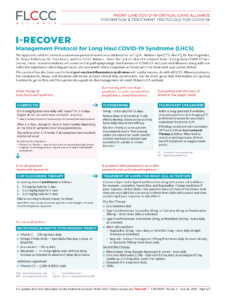
SHARE THIS ARTICLE:
FLCCC Announces Treatment Protocol for Long Haul COVID-19
 A new protocol for patients suffering from Long Haul COVID-19 Syndrome (LHCS) has been developed in a collaboration led by Dr. Mobeen Syed (“Dr. Been”), Dr. Ram Yogendra, Dr. Bruce Patterson, Dr. Tina Peers, and the Front Line COVID-19 Critical Care Alliance (FLCCC). The protocol, I-RECOVER, is based on the group’s experiences using certain therapies with a focus on the drug ivermectin. The group observed “consistent, sustained, and often profound” clinical responses with the I-RECOVER protocol. The protocol has also been used to treat post-vaccine inflammatory syndromes with similar success. LHCS consists of often debilitating symptoms such as malaise, headaches, generalized fatigue, sleep difficulties, smell disorder, decreased appetite, painful joints, dyspnea, chest pain and cognitive dysfunction. LHCS does not only occur after severe COVID-19 cases – it often affects mild-to-moderate cases and younger adults. LHCS symptoms after COVID-19 infection or vaccination can occur from 10% up to 80% of the time. (LHCS from vaccination is likely due to monocyte activation by the spike protein from the vaccine). Studies of treatment options for LHCS are few, and there are no pharmacologic treatments offered. Due to the large numbers of patients suffering with LHCS around the world, the I-RECOVER protocol was developed. LHCS is very similar to the chronic inflammatory response syndrome (CIRS)/myalgic encephalomyelitis/chronic fatigue syndrome and mast cell activation syndrome. Delayed treatment with ivermectin when early symptoms occur, will most likely cause a high viral load, which would increase the risk and severity of LHCS. As with all FLCCC Alliance protocols, the I-RECOVER may change as scientific and clinical data evolves. Click here for FLCCC article and I-RECOVER protocol
A new protocol for patients suffering from Long Haul COVID-19 Syndrome (LHCS) has been developed in a collaboration led by Dr. Mobeen Syed (“Dr. Been”), Dr. Ram Yogendra, Dr. Bruce Patterson, Dr. Tina Peers, and the Front Line COVID-19 Critical Care Alliance (FLCCC). The protocol, I-RECOVER, is based on the group’s experiences using certain therapies with a focus on the drug ivermectin. The group observed “consistent, sustained, and often profound” clinical responses with the I-RECOVER protocol. The protocol has also been used to treat post-vaccine inflammatory syndromes with similar success. LHCS consists of often debilitating symptoms such as malaise, headaches, generalized fatigue, sleep difficulties, smell disorder, decreased appetite, painful joints, dyspnea, chest pain and cognitive dysfunction. LHCS does not only occur after severe COVID-19 cases – it often affects mild-to-moderate cases and younger adults. LHCS symptoms after COVID-19 infection or vaccination can occur from 10% up to 80% of the time. (LHCS from vaccination is likely due to monocyte activation by the spike protein from the vaccine). Studies of treatment options for LHCS are few, and there are no pharmacologic treatments offered. Due to the large numbers of patients suffering with LHCS around the world, the I-RECOVER protocol was developed. LHCS is very similar to the chronic inflammatory response syndrome (CIRS)/myalgic encephalomyelitis/chronic fatigue syndrome and mast cell activation syndrome. Delayed treatment with ivermectin when early symptoms occur, will most likely cause a high viral load, which would increase the risk and severity of LHCS. As with all FLCCC Alliance protocols, the I-RECOVER may change as scientific and clinical data evolves. Click here for FLCCC article and I-RECOVER protocol





